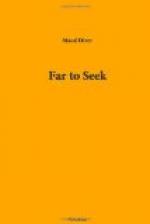It had been his own choice—if you could call it so,—starting this way, instead of in the friendly atmosphere of the Jaipur Residency. But was there really such a thing as choice? The fact was, he had simply obeyed an irresistible impulse,—and to-morrow he would be glad of it. To-night, after that interminable journey, his head ached atrociously. He felt limp as a wet dish-clout; his nerves all out of gear ... Perhaps those confounded doctors were not such fools as they seemed. He cursed himself for a spineless ineffectual—messing about with nerves when he had been lucky enough to come through four years of war with his full complement of limbs and faculties unimpaired. Two slight wounds, a passing collapse, from utter fatigue and misery, soon after his mother’s death; a spell of chronic dysentery, during which he had somehow managed to keep more or less fit for duty;—that was his record of physical damage, in a War that had broken its tens of thousands for life.
But there are wounds of the mind; and the healing of them is a slow, complex affair. Roy, with his fastidious sense of beauty, his almost morbid shrinking from inflicted pain, had suffered acutely, where more robust natures scarcely suffered at all. Yet it was the robust that went to pieces—which was one of the many surprises of a War that shattered convictions wholesale, and challenged modern man to the fiercest trial of faith at a moment when Science had almost stripped him bare of belief in anything outside himself.
Roy, happily for him, had not been stripped of belief; and his receptive mind, had been ceaselessly occupied registering impressions, to be flung off, later, in prose and verse, that She might share them to the full. A slim volume—published, at her wish, in 1916—had attracted no small attention in the critical world. At the time, he had deprecated premature rushings into print; but afterwards it was a blessed thing to remember the joy he had given her that last Christmas—the very last....
On the battlefield, if there had been nerve-shattering moments, these had their counterpart in moments when the spirit of his Rajput ancestors lived again in him, when he knew neither shrinking nor horror nor pity: and in moments of pure pleasure, during some quiet interlude, when larks rained music out of the blue; when he found himself alone with the eerie wonder of dawn over the scarred and riven fields of death; or when he discovered his Oriental genius for scout work that had rapidly earned him distinction and sated his love of adventure to the full.




